
IMETH 12.5 mg/0.5 ml Injectable Solution in Pre-filled Syringe
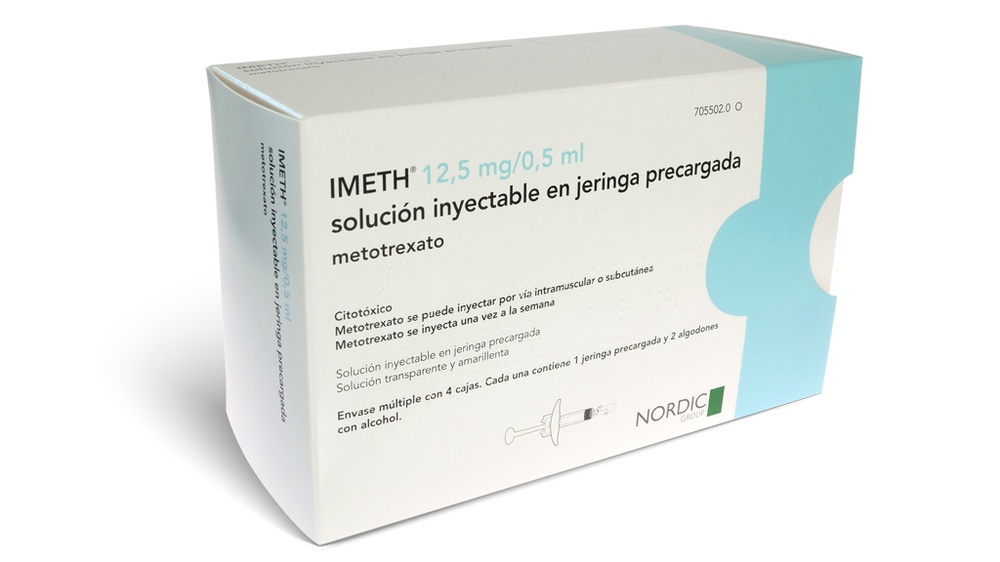

How to use IMETH 12.5 mg/0.5 ml Injectable Solution in Pre-filled Syringe
Translated with AI
This page provides general information and does not replace a doctor’s consultation. Always consult a doctor before taking any medication. Seek urgent medical care if symptoms are severe.
Show originalContents of the leaflet
Introduction
Package Leaflet: Information for the User
IMETH12.5mg/0.5 mlinjectable solution in a pre-filled syringe
Metotrexate
Read all of this leaflet carefully before you start using this medicine because it contains important information for you.
- Keep this leaflet, you may need to read it again.
- If you have any further questions, ask your doctor or pharmacist.
- This medicine has been prescribed for you only. Do not pass it on to others. It may harm them, even if their signs of illness are the same as yours.
- If you get any side effects, talk to your doctor or pharmacist. This includes any possible side effects not listed in this leaflet. See section 4.
Contents of the pack
- What is IMETH and what is it used for
- What you need to know before you use IMETH
- How to use IMETH
- Possible side effects
- Storage of IMETH
- Contents of the pack and other information
1. What is IMETH and what is it used for
Imeth is a medicine that has the following properties:
- Interferes with the growth of certain body cells that multiply rapidly (antitumor agent).
- Reduces unwanted reactions of the body's own defense mechanism (immunosuppressant).
- Has anti-inflammatory effects.
Imeth is indicated for the treatment of:
- Active rheumatoid arthritis in adult patients.
- Polyarticular forms of active and severe juvenile idiopathic arthritis when the response to non-steroidal anti-inflammatory drugs (NSAIDs) has been inadequate.
- Severe recalcitrant psoriasis that does not respond adequately to other forms of treatment such as phototherapy, PUVA, and retinoids, and severe psoriasis that affects the joints (psoriatic arthritis) in adult patients.
- Mild to moderate Crohn's disease in adult patients who are refractory or intolerant to thiopurines.
2. What you need to know before you use IMETH
Important warning regarding the administration of methotrexate:
Methotrexate should only be used once a week for the treatment of rheumatic or skin diseases. Inadequate administration of methotrexate can cause serious side effects, including a fatal outcome. Read section 3 of this leaflet carefully.
Ask your doctor or pharmacist if you have any questions before using Imeth.
Do not useIMETH:
- If you are allergic (hypersensitive) to methotrexate or any of the other ingredients of this medicine (see section 6).
- If you have any serious kidney disease (your doctor will decide the severity of the disease).
- If you have any serious liver disease (your doctor will decide the severity of the disease).
- If you have hematopoietic system disorders.
- If you have high alcohol consumption.
- If you have an altered immune system.
- If you have a severe or existing infection; e.g., tuberculosis and HIV.
- If you have gastrointestinal ulcers.
- If you are pregnant or breastfeeding (see section "Pregnancy, breastfeeding, and fertility").
- If you are receiving live vaccines at the same time.
Warnings and precautions
Acute pulmonary hemorrhage has been reported with methotrexate in patients with underlying rheumatologic disease. If you observe blood when coughing or spitting, you should contact your doctor immediately.
If you, your partner, or your caregiver notice the appearance or worsening of neurological symptoms, such as general muscle weakness, vision changes, changes in thinking, memory, and orientation that cause confusion and personality changes, contact your doctor immediately because these may be symptoms of a rare and serious brain infection called progressive multifocal leukoencephalopathy (PML).
Methotrexate can make your skin more sensitive to sunlight. Avoid intense sun exposure and do not use sunbeds or UV lamps without medical advice. To protect your skin from intense sun exposure, wear suitable clothing or use a sunscreen with a high protection factor.
Consult your doctor before starting to use Imeth
- If you have diabetes mellitus treated with insulin.
- If you have chronic inactive infections (e.g., tuberculosis, hepatitis B or C, herpes [herpes zoster]).
- If you have or have had any liver or kidney disease.
- If you have problems with lung function.
- If you are severely overweight.
- If you have abnormal fluid accumulation in the abdomen or in the space between the lungs and the chest wall (ascites, pleural effusion).
- If you are dehydrated or have a disorder that can cause dehydration (vomiting, diarrhea, stomatitis).
The treatment should be administered once a week.
Incorrect administration of methotrexate can cause serious side effects, including potentially fatal side effects. Read section 3 of this leaflet carefully.
If you have had skin problems after radiation therapy (radiation-induced dermatitis) and sunburn, these conditions may recur during treatment with methotrexate (memory reaction).
Use in children, adolescents, and elderly patients
The administration instructions depend on the patient's body weight. The use is not recommended in children under 3 years of age due to insufficient experience in this age group.
Children and elderly patients being treated with Imeth should undergo particularly frequent medical check-ups to identify potential side effects as soon as possible.
A doctor should closely monitor elderly patients being treated with methotrexate to detect potential side effects as soon as possible.
In elderly patients, in case of age-related liver and kidney insufficiency and low folate reserves in the body, a relatively low dose of methotrexate is required.
Special precautions during treatment with Imeth
Imeth should only be prescribed by doctors with sufficient experience in treating the disease with methotrexate.
Methotrexate temporarily affects sperm and egg production. Methotrexate can cause abortions and severe birth defects. If you are a woman, you should avoid becoming pregnant while receiving methotrexate and for at least 6 months after stopping treatment with methotrexate. If you are a man, you should avoid fathering a child while receiving methotrexate and for at least 3 months after stopping treatment.
See also section "Pregnancy, breastfeeding, and fertility".
Skin changes caused by psoriasis may worsen during treatment with Imeth if you are also exposed to UV radiation.
Recommended follow-up examinations and precautions:
Even when methotrexate is used in low doses, serious side effects can occur. To detect them in time, your doctor will perform check-ups and laboratory tests.
Before starting treatment:
Before starting treatment, you will have a blood test to determine if you have enough blood cells. You will also have a blood test to check liver function and to detect hepatitis. Additionally, serum albumin levels (a blood protein), hepatitis status, and kidney function will be checked. Your doctor may also decide to perform other liver tests, which may involve imaging of the liver or taking a small tissue sample from the liver for a more thorough examination. Your doctor may also check if you have tuberculosis and perform a chest X-ray or lung function test.
During treatment:
Your doctor may perform the following examinations:
- Examination of the oral cavity and pharynx to detect changes in the mucosa, such as inflammation or ulcers.
- Blood test/complete blood count with blood cell count and measurement of serum methotrexate levels.
- Blood test to monitor liver function.
- Imaging tests to monitor liver status.
- Taking a small tissue sample from the liver for a more thorough examination.
- Blood test to monitor kidney function.
- Monitoring of the respiratory tract and, if necessary, lung function test.
It is very important that you attend these scheduled examinations.
If the results of some of these tests are abnormal, your doctor will adjust the treatment accordingly.
Other medicines and IMETH
Tell your doctor or pharmacist if you are using, have recently used, or might use any other medicines, including medicines obtained without a prescription, herbal medicines, or natural products.
It is especially important that you inform your doctor if you are using:
- Other treatments for rheumatoid arthritis or psoriasis, such as leflunomide, sulfasalazine (also used for ulcerative colitis), aspirin, phenylbutazone, or aminopyrine.
- Alcohol (should be avoided).
- Live vaccines.
- Azathioprine (used to prevent organ rejection after transplantation).
- Retinoids (used to treat psoriasis and other skin diseases).
- Anticonvulsant medicines (to prevent seizures).
- Cancer treatments.
- Barbiturates (injection for sleeping).
- Tranquilizers.
- Oral contraceptives.
- Probenecid (for gout).
- Antibiotics.
- Pyrimethamine (used to prevent and treat malaria).
- Vitamin preparations containing folic acid.
- Proton pump inhibitors (used to treat severe stomach acid or ulcers).
- Theophylline (used to treat asthma).
- Metamizole (synonyms: novaminsulfon and dipyrone) (medicine for severe pain and/or fever).
UsingIMETHwith food,drinks, and alcohol
During treatment with Imeth, you should avoid consuming alcohol and excessive amounts of coffee, caffeinated soft drinks, and black tea.
Also, make sure to drink plenty of fluids during treatment with Imeth because dehydration (reduction of body water) can increase the toxicity of Imeth.
Pregnancy, breastfeeding, and fertility
If you are pregnant or breastfeeding, think you may be pregnant, or are planning to have a baby, ask your doctor for advice before using this medicine.
Pregnancy
Do not use Imeth during pregnancy or if you are trying to become pregnant. Methotrexate can cause birth defects, harm the fetus, or cause abortions. It is associated with malformations of the skull, face, heart, and blood vessels, brain, and limbs. Therefore, it is very important that methotrexate is not administered to pregnant women or women who plan to become pregnant. In women of childbearing age, any possibility of pregnancy should be excluded with appropriate measures, for example, a pregnancy test before starting treatment. You should avoid becoming pregnant while taking methotrexate and for at least 6 months after stopping treatment, using reliable contraceptive methods during this time (see also section "Warnings and precautions").
If you become pregnant during treatment or think you may be pregnant, consult your doctor as soon as possible. You should be informed about the risk of harmful effects on the child during treatment.
If you want to become pregnant, consult your doctor, who may refer you to a specialist for information before the planned start of treatment.
Breastfeeding
You should not breastfeed during treatment, as methotrexate passes into breast milk. If your doctor considers that treatment with methotrexate is absolutely necessary during the breastfeeding period, you should interrupt breastfeeding.
Male fertility
Available data do not indicate an increased risk of malformations or abortions if the father takes a dose of methotrexate less than 30 mg/week. However, this risk cannot be completely ruled out. Methotrexate can be genotoxic, which means it can cause genetic mutations. Methotrexate can affect sperm production and cause birth defects. Therefore, you should avoid fathering a child or donating sperm while taking methotrexate and for at least 3 months after stopping treatment.
Driving and using machines
During treatment with Imeth, side effects that affect the central nervous system, such as fatigue and dizziness, may occur. Therefore, in some cases, the ability to drive vehicles and/or use machines may be impaired. If you feel tired or dizzy, you should not drive or use machines.
IMETH contains sodium
This medicine contains less than 1 mmol of sodium (23 mg) per dose, which is essentially sodium-free.
3. How to use IMETH
Important dosage warning for Imeth (methotrexate):
Use Imeth only once a weekfor the treatment of rheumatoid arthritis, active juvenile idiopathic arthritis, psoriasis, psoriatic arthritis, and Crohn's disease. Overuse of Imeth (methotrexate) can be fatal. Read section 3 of this leaflet carefully. If you have any doubts, consult your doctor or pharmacist before taking this medication.
Follow your doctor's instructions for administering this medication exactly. If in doubt, consult your doctor or pharmacist again.
Imeth is administered only once a week. You can decide, along with your doctor, a suitable day of the week for each week you receive your injection.
Incorrect administration of Imeth can cause serious adverse effects, including potentially fatal adverse effects.
The normal dose is:
Dosage in patients with rheumatoid arthritis
The recommended initial dose is 7.5 mg of methotrexate once a week. Imeth is administered in a single application in the form of a subcutaneous injection (see the "Method and duration of administration" section).
If this proves inadequate and is well tolerated, the doses of Imeth may be increased. The average weekly dose is 15-20 mg. Generally, a weekly dose of 25 mg of Imeth should not be exceeded. Once the desired therapeutic results are achieved, the dose should be reduced, if possible, gradually to the lowest possible maintenance dose.
Dosage in children and adolescents under 16 years of age with polyarticular forms of juvenile idiopathic arthritis
The recommended dose is 10-15 mg/m2 of body surface area per week. In cases of inadequate response, the weekly dose may be increased up to 20 mg/m2 of body surface area/week. However, more frequent medical checks should be performed. It should be administered via a subcutaneous injection (under the skin).
Use in children under 3 years of age is not recommended due to insufficient experience with this age group.
Adults with severe forms of psoriasis vulgaris or psoriatic arthritis
A single test dose of 5-10 mg is recommended to assess potential harmful effects. This dose can be administered subcutaneously (under the skin).
If no changes in blood count are observed after one week, treatment should continue with a dose of approximately 7.5 mg. The dose can be gradually increased (in increments of 5-7.5 mg each week and monitoring the blood count) until the desired therapeutic results are obtained. Generally, a weekly dose of 20 mg may be associated with a significant increase in toxicity. A weekly dose of 30 mg should not be exceeded. Once the desired therapeutic results are achieved, the dose should be reduced weekly to the lowest possible maintenance dose for the patient.
Dosage in adult patients with Crohn's disease
The duration of treatment will be decided by your doctor. Treatment of Crohn's disease with Imeth is long-term treatment.
- Induction treatment:
25 mg/week administered subcutaneously.
Response to treatment can be expected approximately after 8 to 12 weeks.
- Maintenance treatment:
15 mg/week administered subcutaneously.
This medication is not indicated for pediatric patients with Crohn's disease.
Patients with renal disorder
Patients with a renal disorder may require a dose reduction.
Method and duration of administration
Your doctor will determine the duration of treatment. Imeth is injected once a week. It is recommended to specify a particular day of the week as the day of injection. Imeth is administered in the form of a subcutaneous injection. Treatment of rheumatoid arthritis, juvenile idiopathic arthritis, psoriasis vulgaris, and psoriatic arthritis with Imeth is long-term treatment.
Rheumatoid arthritis
Generally, an improvement in symptoms can be expected after 4-8 weeks of treatment. Symptoms may reappear after discontinuation of treatment with Imeth.
Severe forms of psoriasis vulgaris and psoriatic arthritis (psoriatic arthropathy)
Response to treatment can be expected generally after 2-6 weeks. Depending on the clinical picture and changes in laboratory parameters, treatment will be continued or discontinued.
At the start of treatment, Imeth may be injected by medical personnel. However, your doctor may decide that you can learn to inject Imeth yourself. You will receive appropriate training for this. Under no circumstances should you attempt to inject yourself unless you have been taught to do so.
How to administer an IMETH injection
If you do not know how to handle the syringe, ask your doctor or pharmacist. Do not attempt to inject yourself if you have not received training. If you are unsure what to do, speak immediately with your doctor or nurse.
Before injecting IMETH
- Check the expiration date of the medication. Do not use it if the expiration date has passed.
- Check that the syringe is not damaged and that the medication has the appearance of a clear solution. If not, use another syringe.
- Inspect the last injection site to see if the last injection has caused any redness, skin color change, swelling, suppuration, or persistent pain; if so, speak with your doctor or nurse.
- Decide where you will inject the medication. Change the injection site each time you administer an injection.
Instructions on how to inject IMETH
- Wash your hands well with water and soap.
- Sit or lie down in a comfortable and relaxed position. Make sure you can see the area of the skin where you will perform the injection.
- The syringe is preloaded and ready to use. Open the blister pack by completely removing the top layer of the blister as shown.

- Caution: DO NOT hold the product by the plunger or needle cap. Remove the syringe from the box by holding it by the body as shown in the image below.
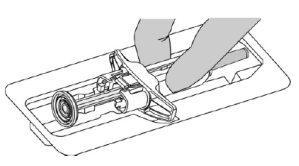
- Visually inspect the syringe. You should be able to see a yellow liquid through the viewing window. You may see a small air bubble; this will not affect the injection and will not harm you.
- Choose an injection site and disinfect it with the alcohol swab provided. It takes between 30 and 60 seconds to take effect. Suitable areas for injection are the skin on the front of the abdominal wall and the skin on the front of the thigh.
- While holding the syringe body, remove the cap.
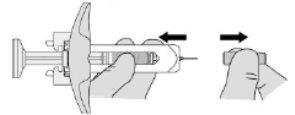
Do notpress the plunger before self-injecting to eliminate air bubbles. If you do, you may lose medication. After removing the cap, hold the syringe in your hand. Avoid letting the syringe come into contact with any other object. This ensures that the needle remains clean.
- Hold the syringe with the hand you write with (as if it were a pencil) and, with the other hand, form a fold in the skin by gently pinching the skin at the injection site with your index and thumb fingers. Make sure to hold the skin fold during the entire injection.
- Move the syringe toward the skin fold (injection site) with the needle protector pointing directly at the injection site. Insert the needle all the way into the skin fold.
- Press the plunger down with your finger until the syringe is empty. This will inject the medication under the skin.
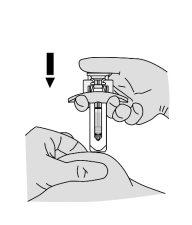
- Remove the needle; to do this, pull it out straight. The syringe's safety protector will automatically cover the needle to prevent needlestick injuries. You can now release the skin fold.
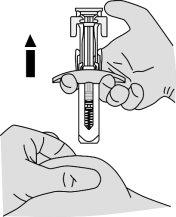
Note: The safety system that releases the safety protector can only be activated when the syringe is emptied by pressing the plunger to the end. To avoid bruising, do not rub the injection site after injecting.
- Dispose of the syringe in the provided sharps container. Close the container lid tightly and keep it out of the reach of children. In case of accidental contact of methotrexate with the skin or soft tissues, rinse the area with plenty of water. When the container is full, return it to your doctor or nurse for disposal. Do not throw it in the trash.
If you use more IMETH than you should
Follow your doctor's administration recommendations. Do not change the dose on your own.
If you suspect that you (or another person) have administered too much Imeth, contact your doctor or go immediately to the nearest hospital. They will decide what therapeutic measures are necessary based on the severity of the poisoning.
An overdose of methotrexate can cause serious toxic reactions. Symptoms of overdose may include bruising or bleeding, unusual weakness, mouth sores, nausea, vomiting, black or bloody stools, coughing up blood or coffee-ground-like vomit, and decreased urine production. See also section 4.
Take the medication packaging with you if you go to the doctor or hospital.
The antidote in case of overdose is calcium folinate.
If you forget to use IMETH
Do not take a double dose to make up for forgotten doses, but continue taking the prescribed dose. Ask your doctor for advice.
If you interrupt treatment with IMETH
Do not interrupt or suspend treatment with Imeth unless you have agreed with your doctor. If you suspect serious adverse effects, contact your doctor immediately.
If you have any other questions about the use of this medication, ask your doctor or pharmacist.
4. Possible side effects
Like all medications, this medication can cause side effects, although not everyone will experience them.
Inform your doctor immediately if you experience sudden weakness; difficulty breathing; swelling of the eyelids, face, or lips; skin rash or itching (especially if it affects the whole body).
Serious side effects
If you develop any of the following side effects, contact your doctor immediately:
- Lung problems (symptoms may be general discomfort, irritating and dry cough, difficulty breathing, feeling of shortness of breath at rest, chest pain, or fever).
- Blood when coughing or spitting.
- Severe blistering or peeling of the skin.
- Unusual bleeding (including vomiting blood) or bruising.
- Severe diarrhea.
- Ulcers in the mouth.
- Black or tarry stools.
- Blood in urine or stools.
- Small red spots on the skin.
- Fever.
- Yellowing of the skin (jaundice).
- Pain or difficulty urinating.
- Thirst and/or frequent need to urinate.
- Seizures (convulsions).
- Loss of consciousness.
- Blurred vision or decreased vision.
The following side effects have also been reported:
Very common: | affect more than 1 person in 10. |
Common: | affect 1 to 10 people in 100. |
Uncommon: | affect 1 to 10 people in 1,000. |
Rare: | affect 1 to 10 people in 10,000. |
Very rare: | affect less than 1 person in 10,000. |
Frequency not known: | cannot be estimated from the available data. |
Very common:
Loss of appetite, nausea (dizziness), vomiting, abdominal pain, inflammation and ulcers in the mouth and throat, and increased liver enzymes.
Common:
Reduced formation of blood cells with a decrease in white blood cells and/or red blood cells and/or platelets (leukopenia, anemia, thrombocytopenia), headache, fatigue, drowsiness, inflammation of the lungs (pneumonia) with dry non-productive cough, difficulty breathing, and fever, diarrhea, skin rash, redness of the skin, and itching.
Uncommon:
Decrease in the number of blood cells and platelets, dizziness, confusion, depression, seizures, inflammation of blood vessels, lung damage, ulcers and bleeding in the digestive tract, liver disorders, diabetes, decrease in blood proteins, urticaria (alone), reactions similar to sunburn due to increased skin sensitivity to sunlight, brown skin discoloration, hair loss, increase in rheumatoid nodules, herpes, painful psoriasis, joint or muscle pain, osteoporosis (reduction of bone mass), inflammation and ulcers in the bladder (possibly with blood in the urine), pain when urinating, severe allergic reactions, inflammation and ulcers in the vagina, and slow wound healing.
Rare:
Inflammation of the sac surrounding the heart, fluid in the sac surrounding the heart, severe vision disturbances, mood swings, low blood pressure, blood clots, sore throat, interruption of breathing, asthma, inflammation of the digestive tract, bloody stools, inflammation of the gums, abnormal digestion, acute hepatitis (liver inflammation), changes in nail color, acne, red or purple spots due to bleeding from blood vessels, bone fractures, kidney failure, decreased or absent urine production, electrolyte disturbances, defective sperm formation, and menstrual disorders.
Very rare:
Infections, severe bone marrow failure, liver failure, inflamed glands, insomnia, pain, muscle weakness, feeling of numbness or tingling/sensitivity less than normal, taste disturbances (metallic taste), inflammation of the brain lining causing paralysis or vomiting, red eyes, damage to the retina of the eye, fluid in the lungs, vomiting blood, fever, loss of sexual desire, erection problems, infection around the nails, serious complications of the digestive tract, boils, small blood vessels in the skin, fungal infections, damage to the blood vessels of the skin, vaginal discharge, infertility, and breast enlargement in men (gynecomastia), lymphoproliferative disorders (excessive increase in white blood cells).
Frequency not known:
Some brain infections (leukoencephalopathy), pulmonary hemorrhage, damage to the jawbone (secondary to an excessive increase in white blood cells), tissue destruction at the injection site, redness and peeling of the skin, swelling.
When methotrexate is administered intramuscularly, local adverse effects (burning sensation) or damage (formation of sterile abscesses, destruction of fatty tissue) at the injection site can frequently occur. Subcutaneous administration of methotrexate is well tolerated locally. Only mild local skin reactions were observed, which decreased during treatment.
Methotrexate can cause a reduction in the number of white blood cells and may decrease your resistance to infection. If you experience an infection with symptoms such as fever and severe deterioration of your general health, or fever with symptoms of local infection such as sore throat, pharyngitis, mouth pain, or urinary problems, you should immediately consult your doctor. A blood test will be performed to check for a possible reduction in white blood cells (agranulocytosis). It is important that you inform your doctor about your medication.
Methotrexate can cause serious adverse effects (sometimes life-threatening). Therefore, your doctor will perform tests to check for anomalies in the blood (e.g., low white blood cells, low platelets, lymphoma) and changes in the kidneys and liver.
Reporting side effectsIf you experience any side effects, consult your doctor or pharmacist, even if they are not listed in this leaflet. You can also report them directly through the national reporting system included in the Spanish Pharmacovigilance System for Human Use Medicines: www.notificaram.es. By reporting side effects, you can contribute to providing more information on the safety of this medication.
5. Storage of IMETH
Keep this medication out of sight and reach of children.
Store at a temperature below 25°C.
Keep the syringe in the outer carton to protect it from light.
Do not freeze.
Do not use this medication after the expiration date shown on the label of the preloaded syringe and the carton after EXP. The expiration date is the last day of the month indicated.
The product should be used immediately after opening.
Do not use Imeth if the solution is not transparent and contains particles.
For single use. Dispose of any unused solution. Medications should not be thrown away in drains or trash. Deposit the containers and medications you no longer need in the pharmacy's SIGRE collection point. If in doubt, ask your pharmacist how to dispose of containers and medications you no longer need. This will help protect the environment.
6. Container Content and Additional Information.
Composition of IMETH
- The active ingredient is methotrexate. 1 ml of solution contains 25 mg of methotrexate.
- The other components are sodium chloride, sodium hydroxide, and water for injectable preparations.
Appearance of IMETH and Container Content
The Imeth pre-filled syringes contain a clear and yellowish solution. The pre-filled syringes are equipped with an injection needle and a safety device to prevent needlestick injuries and reuse.
The following package sizes are available:
Pre-filled syringes of 0.3 ml containing 7.5 mg of methotrexate.
Pre-filled syringes of 0.4 ml containing 10 mg of methotrexate.
Pre-filled syringes of 0.5 ml containing 12.5 mg of methotrexate.
Pre-filled syringes of 0.6 ml containing 15 mg of methotrexate.
Pre-filled syringes of 0.7 ml containing 17.5 mg of methotrexate.
Pre-filled syringes of 0.8 ml containing 20 mg of methotrexate.
Pre-filled syringes of 0.9 ml containing 22.5 mg of methotrexate.
Pre-filled syringes of 1.0 ml containing 25 mg of methotrexate.
Injectable solution in packages of 1, 4, 6, and 24 pre-filled syringes.
Each package of 1, 4, 6, and 24 pre-filled syringes contains 2, 8, 12, and 48 alcohol swabs, respectively.
Only some package sizes may be marketed.
Marketing Authorization Holder and Manufacturer
Marketing Authorization Holder
Nordic Group B.V.
Siriusdreef 41
2132 WT Hoofddorp
Netherlands
You can request more information about this medication by contacting the local representative of the Marketing Authorization Holder:
Nordic Pharma SAU
Adolfo Pérez Esquivel 3, 2nd Floor, Office 17.
28232 Las Rozas (Madrid)
Spain
Manufacturer
Cenexi - Laboratoires Thissen SA
Rue de la Papyree 2-6, Braine-L'Alleud, Walloon Brabant
B-1420
Belgium
This medication is authorized in the Member States of the European Economic Area under the following names:
France:
iMETH 12.5 mg/0.5 ml, solution for injection in pre-filled syringe
Netherlands
Methotrexaat Nordic 12.5 mg Solution for injection in a pre-filled syringe
United Kingdom
Zlatal 12.5 mg, solution for injection in pre-filled syringe
Date of the last revision of this prospectus: August 2024
Detailed and updated information on this medication is available on the website of the Spanish Agency for Medicines and Health Products (AEMPS) http://www.aemps.gob.es.
- Country of registration
- Average pharmacy price67.42 EUR
- Active substance
- Prescription requiredYes
- Manufacturer
- This information is for reference only and does not constitute medical advice. Always consult a doctor before taking any medication. Oladoctor is not responsible for medical decisions based on this content.
- Alternatives to IMETH 12.5 mg/0.5 ml Injectable Solution in Pre-filled SyringeDosage form: INJECTABLE, 10 mg/ 1 mlActive substance: methotrexateManufacturer: Ebewe Pharma Ges.M.B.H. Nfg.KgPrescription requiredDosage form: INJECTABLE, 15 mgActive substance: methotrexateManufacturer: Ebewe Pharma Ges.M.B.H. Nfg.KgPrescription requiredDosage form: INJECTABLE, 20 mgActive substance: methotrexateManufacturer: Ebewe Pharma Ges.M.B.H. Nfg.KgPrescription required
Online doctors for IMETH 12.5 mg/0.5 ml Injectable Solution in Pre-filled Syringe
Discuss questions about IMETH 12.5 mg/0.5 ml Injectable Solution in Pre-filled Syringe, including use, safety considerations and prescription review, subject to medical assessment and local regulations.
Frequently Asked Questions






